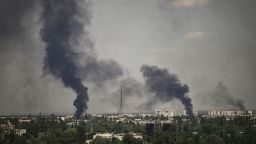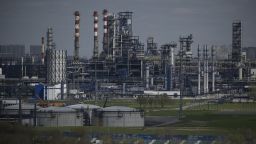Fighting in Ukraine has rounded on Donbas, a sprawling and beleaguered heartland region that has suffered years of conflict and now serves as the bloody stage on which Russia’s war could be decided.
Donbas blankets much of eastern Ukraine, and has been the front line of the country’s conflict with Moscow since 2014.
But now its people, already scarred by eight years of fighting, are enduring an assault even more intense. Russian forces are closing in on the city of Severodonetsk, and are making gradual progress in some parts of the region. Some assaults have been repelled by stubborn Ukrainian counteroffensives.
Failures to take Kyiv and central Ukrainian regions in the invasion’s early months meant Donbas became the centerpiece of Russian President Vladimir Putin’s military ambition.
A Russian victory in the region would appall the West but could salvage Putin’s war aims, while a defeat could cement his invasion as a historic failure. Either way, it is almost certain to devastate yet more of the Donbas region, a historically and culturally significant place whose proximity to Russia has dictated much of its turbulent existence.
Those who have lived in and studied the region describe it as an independent and gritty center of industry that has remained suspicious of outside forces for decades.
But the waves of conflict there since 2014 have reshaped and wounded its cities, and it is along its line of contact that both the Ukrainian and Russian military are most dug in — making for a familiar but unpredictable new phase of war.
What Donbas means to Putin: Despite its move into independence along with the rest of Ukraine in 1991, Donbas has maintained a place in the psyche of Russian leadership.
A famous Soviet propaganda poster from 1921 dubbed Donbas “the heart of Russia,” depicting the region as a beating organ with vessels stretching across the Russian empire. Before then, the region was part of the concept of “Novorossiya,” or New Russia, a term given to territories towards the west of which the Russian empire had expansionist ideas.
Cities like Luhansk and Donetsk are historically “places that (Russians) could see a certain version of themselves,” Finnin said.
And that historical image could still persist inside Putin’s own worldview, experts suggest.
Observers have often suggested that Putin’s desired endgame is to rebuild the Soviet Union in which he first rose up the ranks. Anna Makanju, former director for Russia at the US National Security Council, suggested that Putin “believes he is like the czars,” the imperial dynasties that ruled Russia for centuries, “potentially called by God in order to control and restore the glory of the Russian empire.”
A new Russian assault: Whether the raging battle for Donbas will be the final chapter of Russia’s war, or merely its current phase, remains to be seen. But by zeroing in on the region, Putin has brought his assault on Ukraine full circle.
The so-called “liberation” of Ukraine’s Donbas region was described as an “absolute priority” for Russia by its foreign minister Sergei Lavrov, in an interview with French broadcaster TFI in late May.
The secessionist conflict in Donbas had been costly but stagnant since the initial surges of pro-Russian forces in 2014; the lines of the conflict barely moved in several years, with trenches running along the point of contact from the southern coast to the Ukrainian-Russian border north of Luhansk.
But Russia has made a number of advancements into parts of the Donbas in the weeks since the battle there began.
Read more here:










































